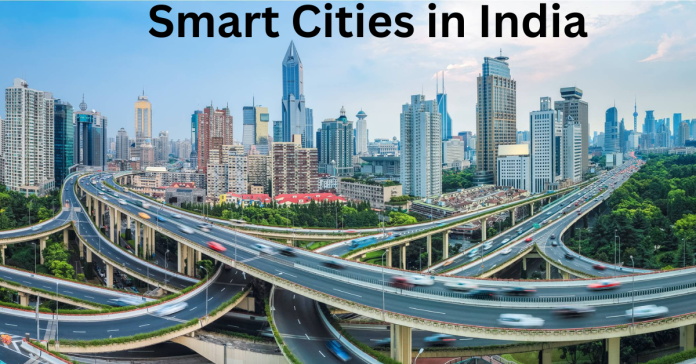The Smart City Mission is a flagship program of the Government of India, overseen by the Ministry of Housing and Urban Affairs. This mission aims to promote sustainable and inclusive urban development through technology and innovation, enhancing cities’ quality of life and efficiency. Currently, 100 cities across India have been identified for development under this program. Let’s explore what it means for a city to be part of this mission and check if your city is included.
What is a Smart City?
A smart city leverages information and communication technologies (ICT) and data-driven solutions to:
- Improve the quality of life
- Enhance sustainability
- Increase efficiency
The concept revolves around integrating various technologies, infrastructure, and services to create a more connected and efficient urban environment.
Benefits of Being a Smart City
For a city, being part of the Smart Cities Mission means striving for sustainable living while providing its residents with superior amenities. This includes improved utility services, garbage collection, social services, mobility, environmental management, and law and order. The mission aims to optimize the use of available land to benefit the growing urban population.
List of Smart Cities in India
Here is a comprehensive list of the 100 smart cities in India:
Uttar Pradesh (14 cities): Lucknow, Kanpur, Prayagraj, Varanasi, Gorakhpur, Raebareli, Jhansi, Aligarh, Saharanpur, Bareilly, Agra, Rampur, Moradabad, Meerut
Tamil Nadu (12 cities): Chennai, Coimbatore, Dindigul, Erode, Madurai, Salem, Thanjavur, Thoothukudi, Tiruchirappalli, Tirunelveli, Tiruppur, Vellore
Maharashtra (8 cities): Thane, Kalyan-Dombivali, Nashik, Amravati, Solapur, Nagpur, Pune, Aurangabad
Madhya Pradesh (7 cities): Bhopal, Indore, Jabalpur, Gwalior, Satna, Ujjain, Sagar
Karnataka (7 cities): Bengaluru, Mangaluru, Belagavi, Shivamogga, Hubbali-Dharwad, Tumakuru, Davanagere
Gujarat (6 cities): Gandhinagar, Surat, Vadodara, Rajkot, Ahmedabad, Dahod
Andhra Pradesh (4 cities): Amaravati, Visakhapatnam, Kakinada, Tirupati
Rajasthan (4 cities): Jaipur, Udaipur, Ajmer, Kota
Bihar (4 cities): Patna, Muzaffarpur, Bhagalpur, Biharsharif
Punjab (3 cities): Ludhiana, Jalandhar, Amritsar
Chhattisgarh (3 cities): Raipur, Bilaspur, Naya Raipur
Kerala (2 cities): Thiruvananthapuram, Kochi
Telangana (2 cities): Warangal, Karimnagar
Haryana (2 cities): Karnal, Faridabad
Odisha (2 cities): Bhubaneshwar, Rourkela
Sikkim (2 cities): Gangtok, Namchi
Jammu and Kashmir (2 cities): Srinagar
Assam (1 city): Guwahati
Himachal Pradesh (1 city): Dharamshala
Uttarakhand (1 city): Dehradun
Jharkhand (1 city): Ranchi
Manipur (1 city): Imphal
Andaman and Nicobar Islands (1 city): Port Blair
Arunachal Pradesh (1 city): Pasighat
Chandigarh (1 city): Chandigarh
Dadra and Nagar Haveli (1 city): Silvassa
Daman and Diu (1 city): Diu
Delhi (1 city): New Delhi
Goa (1 city): Panaji
Lakshadweep (1 city): Kavaratti
Meghalaya (1 city): Shillong
Mizoram (1 city): Aizawl
Nagaland (1 city): Kohima
Puducherry (1 city): Oulgaret
Tripura (1 city): Agartala
Financing the Smart City Mission
The Smart City Mission is primarily funded by the central government, with contributions from state and local governments. Funding mechanisms include:
- Central government allocations are based on proposals submitted by state governments.
- Budgets set aside by state and local governments.
- Collections from user fees, land monetization, beneficiary charges, etc.
- Innovative financing models and pooled finance development fund schemes.
- National Investment and Infrastructure Fund.
- Taking out loans from financial entities that are bilateral or international.
Key Features of Smart Cities
- Sustainable Infrastructure: Energy-efficient buildings, renewable energy, smart grids, smart waste management, water conservation, and efficient transportation.
- Technology Implementation: IoT, AI, data analytics, sensors, and communication networks to connect urban systems.
- Effective Urban Services: Real-time traffic management, efficient parking, public transportation networks, digital service delivery, and improved citizen engagement.
- Data-Driven Decision Making: Data collection and analysis for evidence-based planning and resource optimization.
- Citizen Participation and Engagement: Digital platforms, mobile applications, and open data initiatives for active citizen involvement in urban planning.
Process of Selection for Smart Cities
- States nominate cities for Smart City status.
- A detailed questionnaire evaluates the nominations.
- Cities are shortlisted based on responses and scores.
- Announced cities receive guidance from external agencies and consultants.
Latest Updates
As of May 28, 2024, the Chief Minister of Goa, Pramod Sawant, confirmed that 95% of the Smart City projects in Panaji are complete. Projects include solid waste management, smart radio wireless networks, environmental education in schools, and infrastructure upgrades. The completion date for these projects is set for May 31, 2024.
Conclusion
Smart cities in India are pivotal to the nation’s urban development strategy, aiming to create technologically advanced and sustainable urban centers. This initiative not only improves living standards but also offers promising investment opportunities in real estate, making cities more environmentally friendly, safe, and convenient places to live.
Latest Blogs
- Is Shadnagar Safe for NRI Investment? The 2026 Growth & Legal Report
- Plots vs. Flats: The “5-Year Challenge” – Who Won the Jackpot? (NRI Case Study)
- Power of Attorney (GPA) Format for NRIs Buying Property in Hyderabad (2026 Guide)









